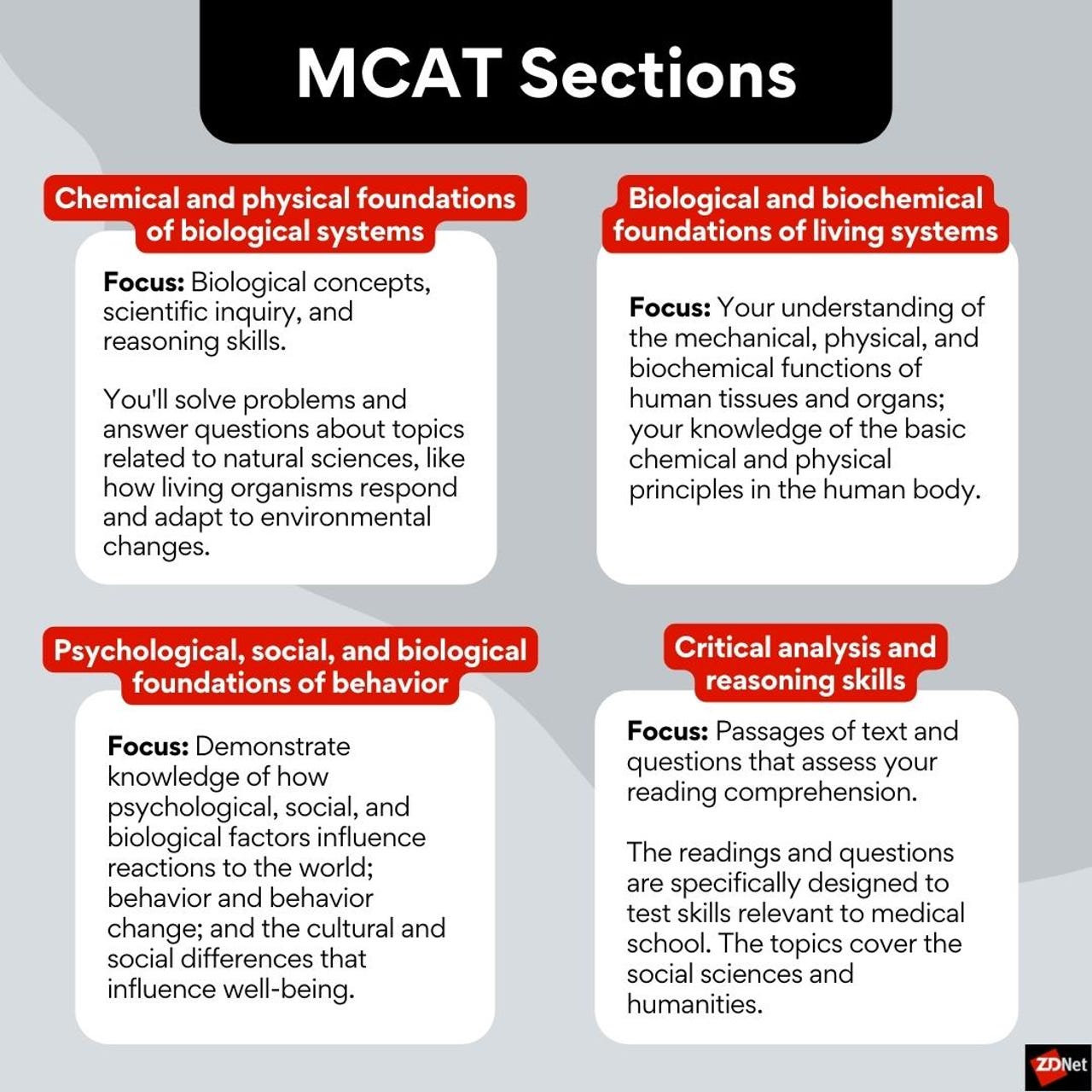What is the MCAT?

More than 88,000 people took the Medical College Admission Test (MCAT for short) at least once in 2020. Almost all medical schools in the U.S. require students to submit exam scores from this standardized test. Many graduate-level healthcare programs also ask for MCAT scores.
Like other standardized tests in higher education — the SAT and the GRE, for example — the MCAT is part of a larger package of information that schools use to screen applicants. The Association of American Medical Colleges (AAMC) develops and manages the test.
Keep reading to learn more about the MCAT, when you should take the exam, and if you need to take it.
Key highlights about the MCAT
Used for | Medical school admission |
Cost | $325 in 2022 |
Duration | Eight hours |
Skills tested | Biology, biochemistry, psychology, and critical analysis skills |
Computer-adaptive? | No |
Scores | Total score range is 472 to 528 |
Average score | 500 |
Available online? | No |
When to take it | Six months before you plan to apply to medical school |
Can you retake it? | Yes |
Are there subject-specific tests? | No |
What knowledge does the MCAT test for?

The MCAT has four sections. Here's a breakdown of what's in each, according to the AAMC.
Biological and biochemical foundations of living systems
Focus: Biological concepts, scientific inquiry, and reasoning skills. You'll solve problems and answer questions about topics related to natural sciences, like how living organisms respond and adapt to environmental changes.
Chemical and physical foundations of biological systems
Focus: Show your understanding of the mechanical, physical, and biochemical functions of human tissues and organs; demonstrate knowledge of the human body's basic chemical and physical principles.
Psychological, social, and biological foundations of behavior
Focus: Demonstrate knowledge of how psychological, social, and biological factors influence reactions to the world; behavior and behavior change; and the cultural and social differences that influence well-being.
Critical analysis and reasoning skills
Focus: Passages of text and questions that assess your reading comprehension. The readings and questions test skills relevant to medical school. Topics cover the social sciences and humanities.
How do I take the MCAT?
Advance registration is required to take the MCAT. You must register at least 10 days before the exam date. AAMC offers the exam at hundreds of testing sites in the U.S. and internationally.
When you sit for the exam, come prepared for an all-day experience. The MCAT takes almost eight hours to complete. You'll have two 10 minute breaks and a 30-minute break.
Can I take the MCAT online?
In contrast with other standardized tests in higher education, you can't take the MCAT from home. As of 2022, you must take this exam in person at a testing center.
"We have concluded at this time that there is no way to ensure equal access and test integrity by administering an online proctored exam," the AAMC maintains. The organization went on to say that in its view, "the only way to administer fair and accurate tests is in professional testing centers."
Can you take the MCAT more than once?
Yes, you may take the MCAT multiple times.
You may take the test three times in a testing year, four times in two consecutive years, or seven times in a lifetime.
Note that if you're a no-show for an exam date or choose to void an exam you complete, these attempts also count toward the lifetime limit.
When should I take the MCAT?
The ideal timing to take the MCAT depends on your situation. The AAMC says students spend about 20 hours per week over three months studying for the MCAT.
Most people take the exam the same year they apply to medical school. For example, if you want to attend medical school this coming fall, you could take the MCAT in the spring — about six months ahead.
The MCAT is offered about 30 times throughout the year in the U.S. Visit the AAMC's MCAT scheduling website for the latest information about testing dates and deadlines.
Also, keep in mind that you do not receive any scoring information immediately after completing the exam. Allow about a month for your official scores to come back.
How is the MCAT scored?
Although the MCAT is a computer-based exam, it is not computer-adaptive. That means the difficulty of the questions does not change based on the answers you give while taking the test.
Scores on each of the exam's four sections range from 118 to 132. For each cohort taking each exam, test-takers' scores from each section are "centered" at 125 (meaning: the average is scored at 125).
Then, the four section scores are combined. The total score is then centered at 500.
You'll receive a score on each section, plus a total score. Total test scores range from 472 to 528. Scores in the top 25% usually range from 508 to 513.
Why is the MCAT "centered"?
Like other standardized tests, the MCAT score is scaled. In simple terms, that means a statistical calculation is applied to your raw score to determine your centered, total score.
This allows the test administrators to create a uniform measure of performance, regardless of which version of the test a person might take.
As a result of this process, it takes about 30 days to receive your official MCAT scores. You'll also receive a percentile rank as part of your score report.
How much does the MCAT cost?
The MCAT costs $325 in 2022 in the U.S. and Canada. Anyone taking the exam outside of the U.S. or Canada must pay an additional $120 "international fee." This fee is non-refundable if you cancel your exam registration.
Anyone interested in taking the MCAT should know that the AAMC charges change and cancellation fees. Also, you can't change your registration fewer than 10 days before your scheduled exam.
If cost is a concern, the AAMC offers a fee assistance program. The program helps people who would be unable to take the MCAT or apply to medical school due to financial hardship.
A variety of MCAT study guides, prep courses, and resources are available. The AAMC offers a free, official sample test, a sample question guide, study plan guidance, and some paid study resources.
Independent organizations like Kaplan offer on-demand, live online, and in-person courses to prep for the MCAT. These options cost $1,799, $2,499, and $2,899, respectively.
Do I need to take the MCAT if I want to pursue medical school?
The short answer is yes. Most students who want to become physicians will probably have to take the MCAT. Although some medical school programs don't require the MCAT, taking the exam will expand your options.
However, a few options exist that don't require taking the exam.
One is a BS/MD program. In these programs, students earn a bachelor's degree. Then they move directly into a doctor of medicine program. Some schools offer accelerated options allowing you to earn a bachelor's degree and MD in six years.
According to Forbes, in early 2021, some schools chose to waive standardized test requirements. The prominent Stanford University School of Medicine was among them.
Other schools still require students to take the MCAT but do not require a minimum score. And others, including Case Western Reserve and Syracuse University, don't require the MCAT to apply to a BS/MD program.
This article was reviewed by Sarah Holliday, MS
Sarah Holliday has years of experience working with nontraditional and traditional-aged students in various areas related to career coaching and training and development. Holliday holds a BA in English from The University of Maryland, Baltimore County, and an MS in instructional design and technology (training and performance improvement) from Walden University.
Holliday is currently working on her doctorate and looks forward to dissertating soon.
Sarah Holliday is a paid member of the Red Ventures Education freelance review network.
Last reviewed March 31, 2022.